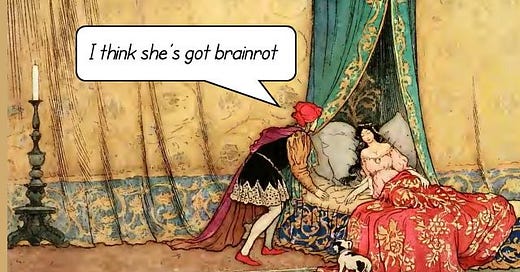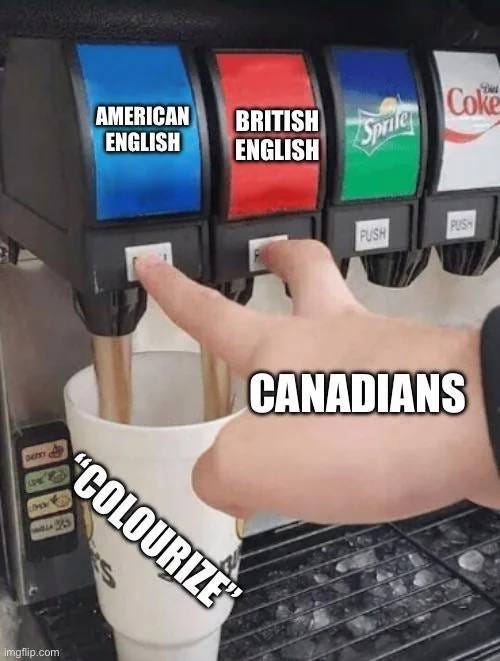Hope this doesn't give you brainrot 🧠, weird rawdogging apostrophes ✍️, yay for tonic masculinity 👨
Welcome to the latest instalment of English in Progress, the newsletter that keeps you updated on the English language. Appears in your inbox whenever my lists are long enough.
My name is Heddwen Newton, I’m an English teacher and translator. I love discovering all the ways English is spoken, the ways in which it is used by different generations and by people from all over the world.
Gen Zalpha slang
Slang used by mostly Gen Z (born 1996 to 2010, more or less) and sometimes Gen Alpha (born 2010 to 2024). Click on the word to see where I got it from.
aura - the unquestionable confidence of a person (On Urban Dictionary with this definition since 2006)
auramaxxing - maximizing your energy and overall presence (not yet on Urban Dictionary)
brainrot - a state of mental deterioration caused by consuming repetitive, low-quality, and highly addictive online content, typically in the form of short videos. Often used in combination with the thing causing the brainrot “you’ve got TikTok brainrot” (On Urban Dictionary with this definition since 2023)
face journey - a series of expressions that appear on someone’s face showing different emotions that they are experiencing as a reaction to something (On Urban Dictionary since 2019)
mini-retirement - taking a significant break from your job to pursue a passion project. Also known as an adult gap year or a sabbatical. (not yet on Urban Dictionary)
say less - conveys clear agreement and confirmation of shared feelings or sentiments. Probably derived from “say no more”. (On Urban Dictionary since 2011)
to speedrun - to complete something (originally a computer game) as quickly as possible, taking advantage of glitches. “"I tried to speedrun college.” (On Urban Dictionary since 2012)
Top reads
No way I can send out this newsletter without featuring at least one article about the word “weird”. The Hollywood Reporter gives an overview of the word’s history and notes that the word was becoming quite positive; something authentic and interesting. But the Democrats have brought “weird back to its icky, othering connotations.” / The Hollywood Reporter
The slang term “rawdogging”, which has historically been used to refer to sexual intercourse without a condom, has been adopted to describe almost any activity accomplished without the assistance of a buffer. / The New York Times (gift link)
Is it Harris’s election campaign, or Harris’ election campaign? Most write the former, AP writes the latter. The best thing about this article is that they actually phoned former Democratic presidential candidate Michael Dukakis, now 90, to ask him about his opinion. About an apostrophe. Excellent. / The Guardian
Neologisms
My admittedly subjective criterion for words to make this list is that they seemed new and interesting to me. Click on the word for my source. Big thanks to the Words of the Week segment at the end of the podcast Because Language, and the Cambridge New Words Blog.
AI washing - the intentional overstating of a product or service’s AI capabilities to make such product or service appear more innovative or intelligent than it actually is
broligarchy - a small group of men who control a situation or political power structure. It differs from an ordinary oligarchy in that a broligarchy carries with it a connotation of toxic masculinity, and is at times connected specifically to tech bros. (Fantastic write-up by Wordorigins in link)
(to be) coconut pilled - (to come around to) supporting US presidential candidate Kamala Harris
decel - someone who believes that AI and other new technologies are developing so quickly that they are likely to cause very serious problems and that progress should be deliberately slowed down
fridgescaping - making sure the inside of your fridge is just as aesthetically pleasing as the rest of your home
justi-vacation - or “justified vacation”; when someone takes a vacation despite not being able to afford the expenses that come with traveling. (The logic for this portmanteau doesn’t work for my British-English brain, as this would be an unjustified vacation, no? But it really is a term that is going around, I’ve checked.)
personality hire - a workplace recruit selected primarily for their interpersonal skills, positive attitude, and ability to enhance team morale, rather than for specific technical skills or experience
rapo baby - portmanteau of “rap” and “nepo baby”; an artist who is the child of a famous hip-hop artist. (The article in the link takes the term seriously and seems unaware of how rapo baby sounds. Hello?! I don’t usually do predictions in this newsletter, but my prediction is that this one is not a keeper.)
slop - AI-generated content that is unwanted and of poor quality (this has been on my radar since May, and I can’t believe I haven’t listed it yet; some neologism-watcher I am!)
social tonic - a liquid refreshment that has a low dose of CBD and/or THC, used as an alcohol replacement
tonic masculinity - the antidote to toxic masculinity; helps and heals. Exemplified, according to some, by Democratic running mate Tim Walz
tolyamory - a relationship in which one party tolerates the other person’s outside sexual relations. Portmanteau from the words “tolerate” and “polyamory”
weird-checking - a strategy of labeling certain attitudes or behaviors as "weird" to challenge their perceived social acceptance. “You can’t fact-check whether someone should support the monitoring of pregnant women to restrict their travel. But you can weird-check it.”
Language and society
New pronouns arise in the wake of new identities. They are not the causes of new identities. For example, spoken Mandarin Chinese has only nongendered pronouns, yet China has no high-profile transgender community. An excellent opinion piece by John McWhorter. / The New York Times (gift link)
Members of the Dalit (“untouchable”) caste in India are desperate to learn English, because speaking English is a gateway to better jobs and a better life. However, the caste remains woefully underrepresented in Indian-English literature and among its authors. / ABC
Nigerian professor Ladiípọ̀ Ayọ̀dèjì Bánjọ (1934–2024) reflects, among other things, on the challenges of teaching English in Nigeria, where British norms often clash with local usage. He also addresses the difficulty in creating a standardized form of Nigerian English and the need for a dedicated dictionary. / Medium
Words around the world
In this section, I highlight some words and terms from the richness of the English-speaking world that came to my attention in the past weeks. Click on the word to get more information.
bairn - North-East England English for “child” (also famously Scottish English, but this article is about an academic who wrote a book about the dialects of the North East)
bluff - American English for a high river bank
breaking - (a.k.a. breakdancing) African American English for a competitive, acrobatic dance form that originated in the 1970s, primarily among African-American and Latino youth in the Bronx. "Breaking" might have originated from the "breaks", the instrumental sections, in music tracks. Dancers who excelled during these breaks were called "break boys" and "break girls".
conniption - Texan (USA) English for a fit of rage or hysteria
dribble - UK English for “drool coming from the mouth”
sure look - Irish English for “it is what it is”. Short for “sure looks like it”.
make a party - Miami English for “throw a party” (from the Spanish “hacer una fiesta”)
nesh - Mancunian (Manchester, England) English for “soft, weak or susceptible to the cold”
park - Colorado (USA) English for a basin, a huge grassland flat, in the mountains that is surrounded by bigger mountains. The “park” in the name of the town of South Park (of animated fame) is this kind of park.
And finally…
And finally, a funny video or stupid joke that I found on social media.
The number of mistakes in this newsletter is directly proportionate to the number of times my four(!)-year-old woke me up last night (she has nightmares, poor thing). If you want to give me any feedback (always much appreciated!), you can use the comment button below, or hit reply.
I used very limited AI to create this newsletter, just to help me find the right phrasing once or twice. All articles were chosen, read and summarised by a human being, namely me :-)
The comic was made using an out-of-copyright book illustration that I found on Flickr.
Special thanks to my nephew Q who keeps me updated on Gen Z slang.
Rectification
In my last newsletter, I included the following definition:
to yap - though similar in meaning to the classic sense, for Gen Z, yapping has lost its negative connotation. It is the ability to talk about anything and something to be proud of. To me, as a Brit, it feels close to the word “banter” (not (yet) on Urban Dictionary in this positive sense)
This should have read: “though similar in meaning to the classic sense, for some Gen Zers, yapping has lost its negative connotation.” For most Gen Zers, yapping is still seen as talking too much in an annoying way (in fact, I have been seeing it being used a lot in this sense recently).







Another excellent update, comprehensive and timely and fascinating. As one of the (sadly) few other people tracking and recording neologisms, I'm immensely grateful to Heddwen.
I'm not sure that "sure look" should be translated as "it is what it is" – it's more like "all the objections/points raised can be put to one side", as in "Sure look we might as well," or "Sure look it doesn't matter".